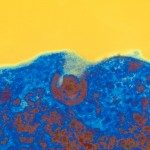Lien vers Pubmed [PMID] – 23802087
Oncoimmunology 2013 Mar;2(3):e23472
Natural killer (NK) cells play a prominent role at the intersection between innate and cognate immunity, thus influencing the development of multiple pathological conditions including HIV-1-induced AIDS. Not only NK cells directly kill HIV-1-infected cells, but also control the maturation and/or elimination of dendritic cells (DCs). These functions are regulated by the delicate balance between activating and inhibiting receptors expressed at the NK-cell surface. Among the former, NKp30 has raised significant interest since the alternative splicing of its intracellular domain leads to differential effector functions, dictating the prognosis of patients bearing gastrointestinal sarcoma, and B7-H6 has recently been identified as its main ligand. Since NKp30 is downregulated in CD56(-)/CD16(+) NK cells expanded in viremic, chronically infected HIV-1(+) patients, we decided to investigate the predictive value of NKp30 splice variants for spontaneous disease progression in 89 therapy-naïve HIV-1-infected individuals enrolled in an historical cohort of patients followed since diagnosis (ANRS SEROCO cohort). We found no difference in the representation of NK-cell subsets (CD56(bright), CD56(dim), CD56(neg)) in HIV-1-infected patients as compared with healthy subjects. NKp30 downregulation was detected in CD56(dim) and CD56(neg) NK-cell subsets, yet this did not convey any prognostic value. None of the NKp30 isoforms did affect disease progression, as measured in terms of time-to-loss of circulating CD4(+) T cells, time-to-AIDS-defining events and overall survival. NKp30 isoforms do not seem to play a major role in the outcome of HIV-1 infection, but the heterogeneity of the immuno-virological status of patients at enrollment could have to be taken into account.


